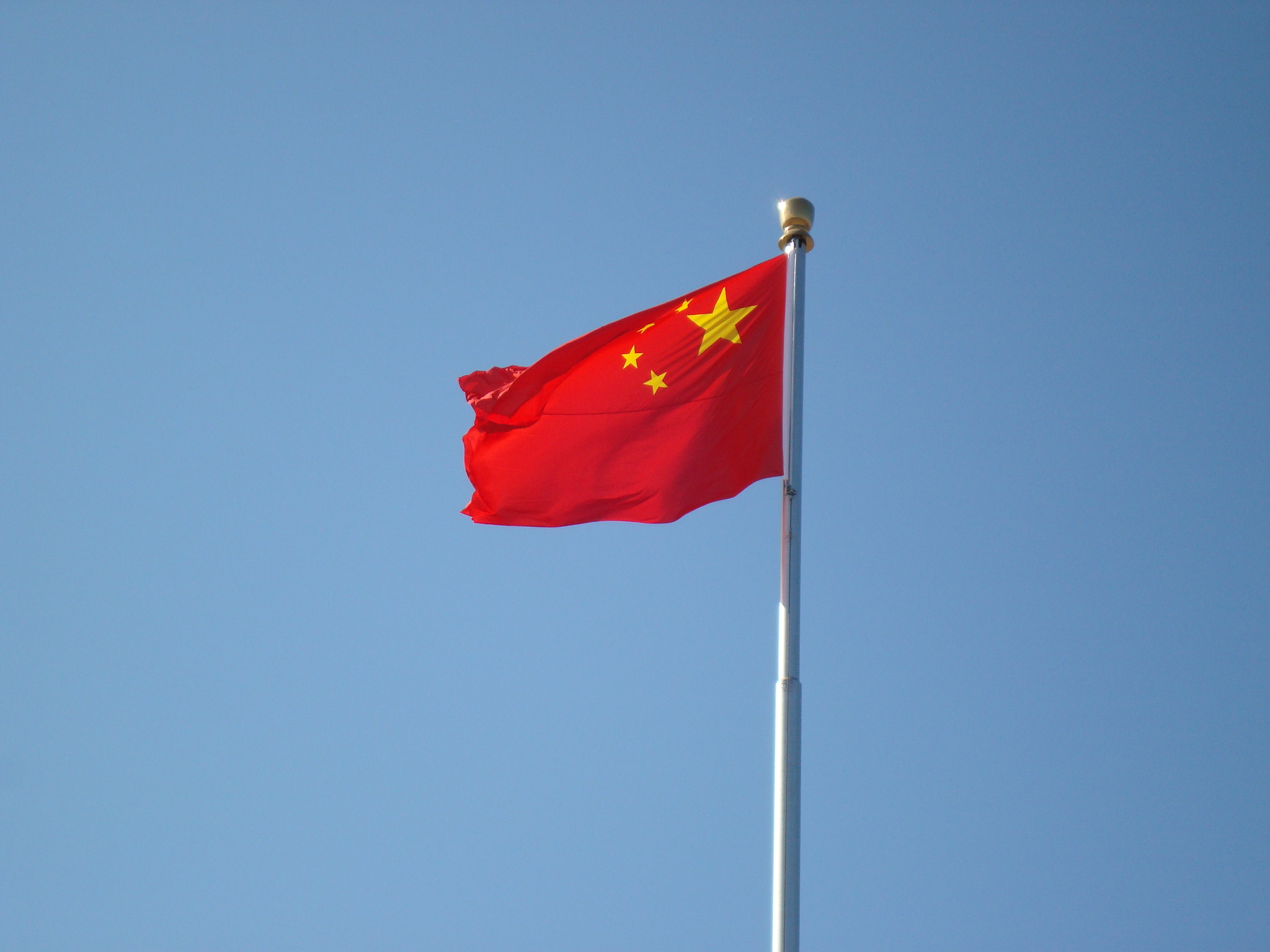Chinese Regulators Order Tech Companies to Standardize Financial Businesses
Lawfare’s biweekly roundup of U.S.-China technology policy and national security news.

Published by The Lawfare Institute
in Cooperation With

On April 29, Chinese regulators from the China Banking Regulatory Commission, China Securities Regulatory Commission, and State Administration of Foreign Exchange announced that they have ordered 13 of China’s biggest tech companies, including Tencent and ByteDance, to “standardize” their online financial businesses. Regulators will likely require firms to spin off payments programs and may even eliminate some firms’ insurance, wealth management and lending practices.
The People’s Bank of China stated that some of the firms will need to set up financial holding companies to house certain parts of their businesses. Financial holding companies are subject to heightened restrictions on their assumption of financial risk. (One commentator suggests that the imposition of capital requirements is meant to ensure that profits are shared more evenly between the tech intermediaries and the large state-owned banks that sometimes do the actual lending.)
Many of these restrictions mirror those imposed on Ant Group earlier this year, including an obligation to sever “improper links” between core payments and financial services. Many firms’ lending programs could shrink significantly because the inflows from core payments often fuel the lending done in other businesses, and additional capital requirements will draw down available cash.
The regulators’ announcements of new instructions with respect to online financial business is an extension of months of government scrutiny of Chinese tech firms’ practices. In April, regulators called in 33 firms to discuss anti-competitive practices; they were instructed to come into full compliance with existing antitrust law by May 13. Though the deadline has not arrived, Meituan is already under investigation for its alleged monopolistic behavior and “abuse of market dominance.” Tencent is reportedly facing a $1.5 billion fine for failing to disclose past investments and acquisitions. In response to months of government scrutiny, a number of top tech firms have hired former regulatory officials to help defend the firms’ interests.
One commentator sees investment in Chinese tech as a bet on the relations between private firms and the government. Some suggest that the government is aiming for fewer cults of personality in the tech world, more data-sharing from tech firms to the government, and less influence for big tech shareholders in industries like health care and media. The latest regulations indicate a government desire to control domestic tech’s financial influence and ensure the centrality of state-owned banks as the economy moves online. The difference between controlling and suffocating an industry is small , and the government’s ultimate standard remains to be seen.
On May 3, Fidelity, the giant U.S. asset manager, reportedly cut its valuation of Ant Group in half from August 2020 to February 2021, in the wake of the regulatory crackdown.
U.S. Lawmakers Back Bipartisan Efforts to Counter China
In recent weeks, bipartisan coalitions in the U.S. Senate and House of Representatives have backed two major bills addressing U.S.-Chinese technology competition. On April 21, the Senate Foreign Relations Committee approved the Strategic Competition Act of 2021 by a vote of 21-1, sending it to the full Senate for approval. On the same day, bipartisan members of both houses of Congress introduced the Endless Frontier Act, calling for $100 billion in government funding for science and technology research over the next five years to compete with China’s technological progress. Strong bipartisan support for both bills underscores the growing willingness among both Republicans and Democrats to bolster America’s competitive edge over China in technologies with economic and national security implications.
The 280-page Strategic Competition Act contains provisions challenging China across a broad range of policy areas, including human rights, economic competition, international development, military and defense, and international cooperation. One provision would require U.S. officials (but not athletes) to boycott the 2022 Winter Olympics in Beijing, as recommended by the U.S. Committee on Religious Freedom. Another provision would further expand the role of the Committee on Foreign Investment in the United States (CFIUS) in scrutinizing international transactions involving Chinese actors, particularly vis-a-vis gifts and contracts with U.S. universities.
Sen. Bob Menendez, the Democratic chairman of the Senate Foreign Relations Committee, stated that the Strategic Competition Act would enable the U.S. to counter China “across every dimension of power: political, diplomatic, economic, innovation, and even cultural.” Republican Sen. Mitt Romney offered strong language, describing the legislation as a necessary but insufficient step toward countering “China’s march toward global hegemony.”
Meanwhile, a bipartisan group of lawmakers led by Senate Majority Leader Chuck Schumer introduced the Endless Frontier Act, which aims to enhance American competitiveness with China by fostering domestic technological progress and supply chain resilience. The bill provides $100 billion in funding for “technology areas critical to national security” and has been endorsed by the Biden White House. The bill would create a new Directorate for Technology and Innovation within the National Science Foundation and establish a regional technology hub program. Administrators at leading science and technology research universities have supported the Endless Frontier Act, but other universities have expressed concern over provisions of the Strategic Competition Act that would enable CFIUS review of Chinese grants and contracts.
The Strategic Competition Act and the Endless Frontier Act are both part of an effort by Schumer, announced in February, to fast-track legislation facilitating U.S. leadership in its competition with China. The legislation has been met with criticism from Chinese officials, who have stated that it “reeks of Cold War and zero sum mentalities.”
Other News
TikTok Names Former ByteDance CFO as New CEO
On April 30, TikTok announced that Shouzi Chew, the current chief financial officer of ByteDance, will take over as TikTok’s new CEO. ByteDance is the Chinese parent company of TikTok, a global video-sharing app, and Chew is based at TikTok’s office in Singapore. TikTok’s interim head, U.S.-based Vanessa Pappas, will become TikTok’s chief operating officer.
TikTok’s senior leadership has been in flux since the rapid departure of U.S.-based CEO Kevin Mayer, who was with the company for only a few months in early 2020. Mayer left the company as it faced impending bans from the Trump administration over national security concerns about Chinese access to U.S. citizens’ sensitive data. The proposed TikTok ban was halted by two federal judges, but the litigation of the bans has been paused by the Biden administration as it reviews its policy toward China.
The Trump administration, through the CFIUS, issued a mandate in August 2020 that ByteDance divest TikTok to a U.S. company, but plans by Oracle and Walmart to purchase TikTok fell through after former President Trump left office without enforcing the divestment order. Some commentators think Chew’s appointment as CEO signals that ByteDance is no longer concerned that the Biden administration will force a divestment of TikTok. The Biden administration, however, says its policy toward TikTok and ByteDance is still under review.
U.S. Puts Additional Pressure on TSMC
The Taiwan Semiconductor Manufacturing Company (TSMC) has been accused of supplying chips to the Chinese military through Phytium, a supercomputer manufacturer that was recently added to the Department of Commerce’s Entity List. The Taiwanese economics minister denied that TSMC knowingly supplied chips for Chinese military use, stating that Taiwanese companies comply with “U.S., domestic, and multilateral rules.”
TSMC has suspended new orders from Phytium. Being added to the Entity List creates a “presumption of denial,” meaning that the entities cannot access American technologies. Analysts suggest that cracking down on the end sales of foreign manufacturers that use American technology, as TSMC does, is critical to stopping the flow of that technology to China and its People’s Liberation Army.
The accusation—and TSMC’s response—is the most recent development in a pattern of U.S. grievances and TSMC capitulation. Last year, the U.S. government pressured TSMC into building a fabrication plant in the United States. U.S. sanctions also ended TSMC’s sales to Huawei, a leading Chinese smartphone manufacturer and 5G provider that the Trump and Biden administrations have treated as a security threat.
The United States and TSMC rely heavily on each other: The firm manufactures some 90 percent of chips used by Apple, Amazon, Google, Qualcomm and other American firms, and the U.S. market makes up 60 percent of the firm’s sales.
President Biden is trying to bolster American semiconductor self-sufficiency. On March 31, he announced a $50 billion investment to strengthen the domestic chip manufacturing industry, as part of his $2 trillion infrastructure plan. Intel, America’s leading chip maker, is 1.5 “generations” (levels of chip advancement, measured by packing the same number of transistors onto a smaller and smaller chip) behind TSMC. In the summer of 2020, Intel had to announce delays in its next-generation chips and hinted that it would outsource some of its manufacturing. But this year, analysts see Intel’s prospects brightening, as it invests additional resources in the United States and appears able to access key equipment (extreme ultraviolet machines) that determine manufacturing capacity.
TSMC has attempted to maintain a careful neutrality between China and the United States. TSMC is also making chips in mainland China; the company built a plant in Nanjing in 2015 and on April 26 made an additional investment in that facility. (As in the United States, some in China feel that it is wisest to prioritize domestic manufacturers and believe that TSMC plants only stifle that progress.) But neutrality has become ever more tricky as Sino-American relations deteriorate, and nowhere is that tension felt more acutely than in Taiwan. Taipei recently accused Beijing of “orchestrated theft of technology” to weaken the island. Some commentators have even speculated that TSMC’s presence could contribute to a Chinese decision to invade Taiwan.
Moreover, TSMC is under great strain due to a global chip shortage, which has hit the auto industry particularly hard. On April 1, the firm announced $100 billion in investments to prevent repeated delays. On the bright side, high global demand may allow TSMC to comply with U.S. restrictions, like the Phytium ban, without sacrificing profit.
U.S. National Security Adviser Says Climate Cooperation Isn’t Bargaining Chip
U.S. National Security Adviser Jake Sullivan said in a panel at the Aspen Forum that China’s cooperation with the U.S. on climate change will not be viewed as a “favor.” Instead, the Biden administration believes that “climate change is a fundamental responsibility in every significant country in the world.”
The remarks came a week after President Biden led a virtual climate summit for 40 world leaders, including Chinese President Xi Jinping. At the summit, Biden pledged to cut U.S. carbon emissions by up to 52 percent by 2030, a promise some commentators dismiss as impractical.
In his speech at the conference, President Xi made more modest commitments to begin decreasing China’s reliance on coal by the middle of the decade and phasing out coal-powered plants in its next five-year plan from 2026 to 2030. A recent report by the Chinese Academy of Sciences in collaboration with a European research institute found that China would need to cut its carbon emissions by 90 percent by 2050 in order to meet its responsibilities under the Paris climate agreement. Xi has previously pledged that China will be fully carbon neutral by 2060.
However, in his comments at the Aspen Forum, Sullivan said that “the jury is very much out” on whether China will cooperate with the rest of the world to reach climate goals.
Commentary
Shen Lu writes for Protocol on Douyin’s attempt to challenge WeChat as China’s all-in-one app.
Koichiro Komiyama and Motohiro Tsuchiya published a piece with the National Bureau of Asian Research on the “triadic conflict” that will define the future U.S.-China tech “confrontation.”
Henry Kissinger gave an interview to a German publication this week on the importance of artificial intelligence leadership to overall U.S.-China competition.
Kate Crawford published a new book, “Atlas of AI,” on the natural resources and human labor that underlie global artificial intelligence development.
Matthew P. Funaiole and Brian Hart discuss China’s space ambitions after the launch of the first component of China’s space station on April 29.
Doowan Lee and Shannon Brandao co-authored an op-ed for Foreign Policy on the risks that dealing with Huawei creates for private businesses.
The Financial Times’s editorial board notes that China’s crackdown on its domestic tech sector has not reached its state-owned enterprises, creating an increasingly imbalanced playing field both for domestically owned private firms and for multinationals.
Evan Burke writes for ChinaFile on how to attract and retain talented Chinese nationals working in STEM to the United States. Remco Zwetsloot and Zachary Arnold, writing in Foreign Affairs, argue that indiscriminate bans of Chinese STEM students studying at U.S. universities will hurt U.S. innovation.
The Council on Foreign Relations printed an interview with Chinese State Councilor Wang Yi.
In Foreign Affairs, Charles L. Glaser questions U.S. policy on Taiwan, and Scott Malcomson muses on a new “age of autarky,” in which superpowers strive for self-sufficiency rather than connectivity.






